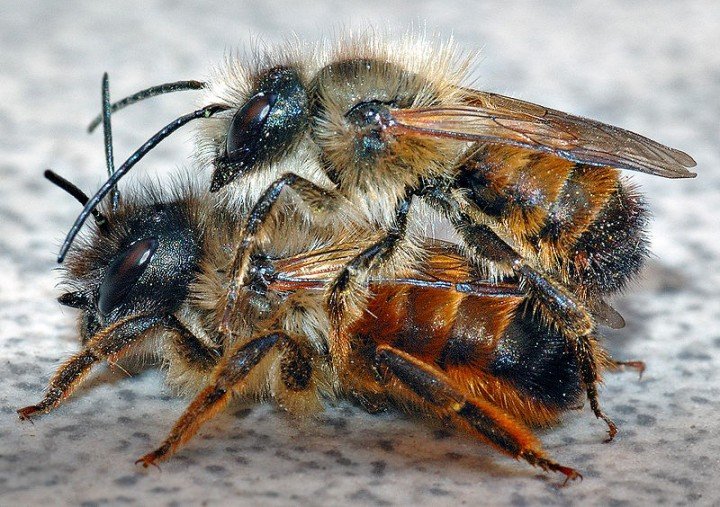
The collapse of honeybee populations is devastating, as practically every fruit and vegetable we eat relies on bees to pollinate the flowers. No pollination means no delicious edibles. But don’t despair.
Solitary bees, especially mason bees (Osmia lignaria), are buzzing to the rescue. Resembling metallic blue flies, these small native bees are easy to attract, work tirelessly even in cool weather and rarely sting. Best of all, they are highly efficient spring pollinators — it’s estimated a single mason bee may visit approximately 2,000 blossoms a day.
To keep mason bees in your garden, install purchased or handmade bee houses in early spring in a protected spot that gets morning sun. Female bees lay their eggs in pre-existing (often tubular) holes, carefully setting each egg atop a pile of pollen and nectar and sealing the compartment with mud. (Give them a hand by providing a muddy patch close by.)
Hatching in late spring, the larvae devour the pollen and then pupate in cocoons. The adult bees overwinter in the cocoons, emerging in early spring to mate and pollinate. You can buy cocoons with dormant bees inside from November to February to place in your mason bee house, or simply put up your bee condo to draw local renters and let them start the process.
When the bees emerge, it is crucial to have flowers available. They will visit and pollinate any flower, but when they emerge they are often seen visiting cane fruit, strawberries, blueberries and even dandelions.
To keep your bee population healthy, clean the houses in late fall/early winter. Remove the cocoons, wash to control pollen mites and store in a metal container in the garage to keep rodents at bay. Return the cocoons to the compartments when the houses go back out in early spring. Your housekeeping efforts will be richly rewarded with bumper crops.


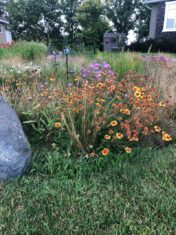
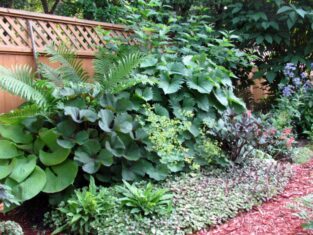

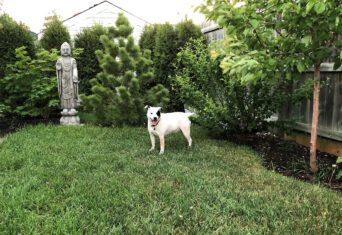
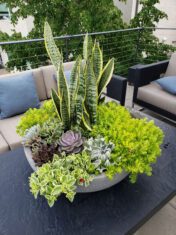
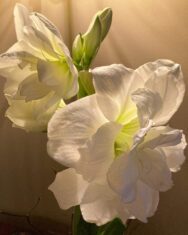

Last year I had my first mason bees. This fall I harvested the cocoons, washed and dried them and put them in a small cardboard container and in my fridge.
I took them out a week ago and put them in my bee house.
Today I checked my cocoons and none of them hatched. I opened one cocoon and the contents were all milky. No adult bee. What would be the cause?
I purchased two Mason bee houses this year from Costco and have six tubes sealed with mud.
can I get info here in Calgary on how to store the houses in the winter and when to put them back
out in the spring.
this is my first time to raise or help the mason bees
HI,I would like to purchase mason bees but I don’t have any spring flowers in my yard,unfortunately I only have summer ones,would I be best to plant some spring bulbs in the fall and purchase the bees next year.I was told they need flowers when they emerge in the fall.Any help would be appreciated
Hi, Becky,
Mason bees emerge in early spring so you definitely need to plant some spring-blooming flowers –- such as fruit trees, pieris, heathers, violets and rock cress. You can put up a mason bee house in spring too so the females have a spot to lay their eggs. Local bees will likely take advantage of the house or you can purchase mason bee cocoons in late fall/winter to stock your house. Good luck encouraging these much-needed native pollinators.
I have red striped bees in my brick chimney. What kind are they? They do not sting. My chimney is not used and has a lid cover on the hole where a pipe once fitted in it. There is also an opening at the bottom to clean out soot, etc.. At one time the chimney was filled with insulation batting around the hole area. How can I get rid of these bees? People have suggested one shot wasp and hornet spray but I’d like your opinion. I have considered blocking off the openings with a spray insulation that hardens like cement. My concern is that the bees could find a way to get from the chimney into the walls of the house. Any assistance you can offer would ve greatly appreciated.
Hi, i was just wondering if you could put up a bee house and just leave it up over the winter? Do you have to take them down, clean them out and then return the cocoons after the winter?
Asking to know if i have to keep track of all the homes that i plan to put up on a 64 acre Island?
Thanks,
Hello Keir
The pollen bee nests that are available from us are insulated using lava insulation and can be kept out all year. For any cleaning that may be required please check our web site for instruction.
We certainly encourage you to keep track of the nests, our nests come with a log card to help you with this.
Good luck.
hi…just purchased a mason bee house from vesey’s seeds…you can find them online !!
Do Mason bees live in Alberta? If so, are there some plants I can put in my garden to encourage them to nest in my yard?
Hello Tracey, You could try contacting beediverse.com, a company that specializes in equipment, books and videos about Mason bees. The company is located in B.C. Roses, cranesbills, willows, currants, gooseberries, apples and viburnums are a few plants appreciated by these useful bees. Beckie
Hi there:
Just saw the following website on your Fall/11 Magazine
http://www.PollenBeeNest.com
This site had great info.
Will be purchasing one so the little ones can find a home in my garden before winter comes to Ontario, Canada.
It would be really appreciated if you could provide instructions for making these bee condos in a future issue. I’m a Sparks and Brownies (Girl Guides) leader and I’m thinking that this would be a really interesting lesson and craft to organize for the girls in my units. Thanks!
To Brigitte: That’s an excellent suggestion and I’ll add that to our story lineup for future issues. In the meantime, try searching “make a mason bee house” online. There are a few different methods described–some require power drills, while others use lengths of small diameter bamboo poles. Beckie Fox, Editor